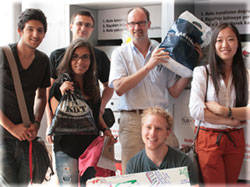 Today I am going to talk about CSR which is short for “Corporate Social Responsibility”. My students and I visited an intercultural Erasmus Intensive Program for students and lecturers from 12 different universities all over Europe organized in Izmir at Yasar University in Turkey. We all shared our knowledge and experience concerning the different approaches to CSR in different countries and learned a lot about challenges and benefits in the European context. In general you could say that CSR is meant to improve the relationship between a company and all its stakeholders. It actually must be the responsibility of us all and especially of successful companies to protect society and the environment. CSR also changes company cultures by improving the relationship with employees, suppliers, customers, the environment and the local community.
Today I am going to talk about CSR which is short for “Corporate Social Responsibility”. My students and I visited an intercultural Erasmus Intensive Program for students and lecturers from 12 different universities all over Europe organized in Izmir at Yasar University in Turkey. We all shared our knowledge and experience concerning the different approaches to CSR in different countries and learned a lot about challenges and benefits in the European context. In general you could say that CSR is meant to improve the relationship between a company and all its stakeholders. It actually must be the responsibility of us all and especially of successful companies to protect society and the environment. CSR also changes company cultures by improving the relationship with employees, suppliers, customers, the environment and the local community.
absolutely timely
We organized a roundtable discussion about CSR with lecturers from all over Europe who all participated in the ERASMUS Intensive Program in Izmir. Together with Ann Knaepen from the Catholic University in Leuven, Belgium, Carla de Lima from the Polytechnic Institute of Bragança in Portugal, Dr. Reka Jablonkai from Corvinus University Budapest in Hungary and Anne Burke from the Letterkenny Institute of Technology in Ireland we discussed different examples of CSR in those countries. We discussed, whether the middle of an economic crisis is really the right time to spend money on CSR-projects.
absolutely win-win
In this category, I would like to dive into the topic a little deeper. I am talking to Laura Brandt from the Haute Ecole de la Province de Liège in Belgium. She is a lecturer for Entrepreneurship and a bit of an expert on SMEs, which means “Small and Medium sized Enterprises”. She tells us that, in fact, 99% of all European companies are SMEs. These companies are facing tough economic challenges right now in the crisis. Laura explains why it is so important for SMEs to integrate Corporate Social Responsibility in their “core business values”. I asked her to tell us how she found out about the subject before joining the intensive seminar in Turkey. Laura gives an interesting example of a cleaning company in which CSR really turned into a win-win situtation for the company and all its stakeholders.
absolutely communicative
Our last guest for today is Adelheid Korpp. Adelheid and her husband love traveling. About 10 years ago, when they decided to travel around the world, she got in touch with an organization called Servas. Servas provides travellers with free accommodation all over the world, but you only get invited to stay at a host’s place if you obey certain rules of the system. Adelheid will explain how she got in touch with Servas and how the system works. This may, in fact, be the best way to get in touch with locals while travelling through different countries. In my opinion Servas is also an excellent example of a non-profit organisation which could be supported by companies. So, if you are a CEO and you are looking for a good CSR-cause – please do get in touch with them.
Our next show will again be coming to you from Dr. Laurent Borgmann on July 6st.
Until then –
Bleiben Sie absolut interkulturell!
The host of this show is: Dr. Laurent Borgmann
Editor: Markus Scherer
![]() Download
Download
![]() Podcast-Feed
Podcast-Feed
![]() iTunes-Abo
iTunes-Abo

Excellent topic for discussion. I am heavily burdened wih my own corporate social responsibility in my daily work. I feel it is a tremendously unfair advantage in the global market that some cultures demand social responsibility of their corporations and some other cultures have no desire for corporate social responsibility at all. We have a major portion of our business plan directly related to our responsibilityto the community, charities and other stakeholders while others in our same industry have no burden in this area.
I believe we all will bear the burdenif some do not act in a socially responsible mannermake it a double hitfor those of us that already do meet that responsibility.